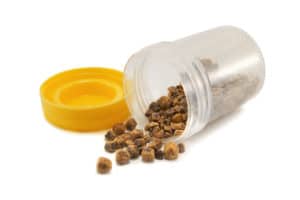What are Kidney and Ureteral Stones Made of?
If you have any questions, to schedule a consultation or if you need a second opinion, please contact us or call: 646-663-4421
Where do Kidney Stones Come from? What are Kidney Stones Made of?
Rather than one single cause, very often several factors occur in combination and lead to the formation of kidney stones.
At a molecular level, kidney stones form when the concentration of crystal-forming substances in the urine (such as uric acid, calcium, and oxalate) is high. This is typically caused when there is not enough fluid in the urine to dilute them.
In addition, if the urine lacks molecules that prevent the crystals from sticking to each other, then this creates the ideal environment for stone formation. For example magnesium blocks kidney stone formation. Chemical analysis of a kidney stone can reveal what it is made up of, and this provides an important clue to the underlying cause of a person’s stone disease.
How are Kidney Stones Formed?
 Kidney stones are made from aggregation or precipitate of normal substances and molecules present in urine. Typically when the concentration of these molecules is high, as a result of low urine volume or high amount of one or more of these molecules, the molecules precipitate and a stone is formed.
Kidney stones are made from aggregation or precipitate of normal substances and molecules present in urine. Typically when the concentration of these molecules is high, as a result of low urine volume or high amount of one or more of these molecules, the molecules precipitate and a stone is formed.
It is important to recognize that many kidney stones are composed from more than one component and are not pure. For example you can get a mixed stone made of calcium and uric acid. In addition, if you have a calcium stone, if you get a kidney stone in the future it may not be a calcium stone.
Kidney Stone Composition
Calcium stones: These account for 80% of kidney stones. In certain individuals, the extra calcium aggregates to form stones in the urine. Calcium stones then aggregate with other minerals and form larger stones. There are 2 types of calcium stones: calcium oxalate and calcium phosphate. Disease conditions such as hyperparathyroidism can cause calcium stones.
Uric acid stones: Increased levels of acid in the urine can cause uric acid stones, which form 5-15% of kidney stones. A non-vegetarian diet (meat, fish) can cause uric acid stones. Consumption of alcohol, reduced urination, inflamed bowel conditions, gout, and genetic factors can also contribute to uric acid stone formation. Uric acid stones are very sensitive to urine pH and can sometimes be dissolved.
Cystine stones: These account for less than 1% of kidney stones. Individuals with a genetic condition called cystinuria are predisposed to increased excretion of cystine into the urine, resulting in cystine stones.
Struvite stones: These are formed following infection of the kidneys and account for 10 to 15% of kidney stones. Struvite stones lead to internal complications and may require surgical intervention. Large struvite stones (staghorn calculi) can damage kidneys and create a number of complications.
Matrix stones: these are made from sloughed off cells of the kidney.
There are a number of less common kidney stones caused by medications and other components.
The symptoms of kidney stones do not vary by their composition. Infections are more common with struvite stones. Once the composition of kidney or ureteral stones is determined, prevention measures can be advised.
If you have any questions, to schedule a consultation or if you need a second opinion, please contact us or call: 646-663-4421
Dr. Alex Shteynshlyuger is a board-certified urologist. He treats men and women with kidney and ureteral stones. He is among the most experienced specialists when it comes to treatment of large kidney stones and ureteral stones. Dr. Shteynshlyuger has performed hundreds of ureteroscopy and lithotripsy procedures for large kidney stones, in addition to ESWL procedures. He is among a select number of urologists in the United States who performs PCNL for large kidney stones.
